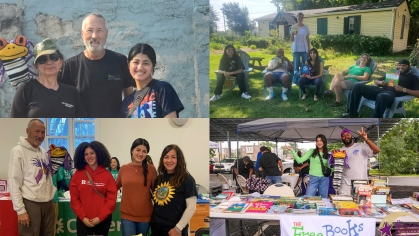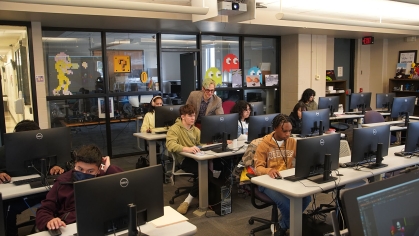New Law Launches Innovative Social-Emotional Learning Program in New Jersey’s Schools; Rutgers–Camden Public Affairs Institute To Lead Evaluation
An innovative social-emotional learning (SEL) program established in the Clayton Public School District will be expanded in up to 30 schools across New Jersey, thanks to a legislative effort that became law on May 11, 2021. Implementation of the program will be evaluated by the Senator Walter Rand Institute for Public Affairs at Rutgers University–Camden.
The Clayton Model – initiated in 2009 as the Child Connection Center in the Clayton School District – is described as an agile, responsive, and trauma-informed intervention program that provides a network of SEL services spanning from individual student support, teacher resources, and classroom strategies, to tools for parents to incorporate SEL strategies in the home to all students regardless of classification.

Sarah Allred, director of the Senator Walter Rand Institute for Public Affairs at Rutgers University–Camden
In May 2021, Senate Bill 2486 (sponsored by Senate President Steve Sweeney) and the identical Assembly Bill 4264 (sponsored by Assemblyman Adam Taliaferro) were signed into law, establishing The Clayton Model Pilot Program in the New Jersey Department of Education, to be implemented in up to 30 schools across the state by 2026. The program, funded in part by part of the Coronavirus Aid, Relief, and Economic Security Act (CARES) Emergency Relief Fund, will provide school-based social-emotional learning supports to students in kindergarten through fifth grade in up to 10 public schools in three counties: one each in northern, central, and southern New Jersey – in the latter case, expanding in Gloucester County.
“As evaluators, we have watched this program successfully adapt to meet the evolving needs of students over the years, particularly as schools moved to virtual instruction during the pandemic and enhanced SEL supports increasingly became essential,” says Sarah Allred, director of the Senator Walter Rand Institute for Public Affairs at Rutgers University–Camden. “We’re excited to play a role in helping to meet this need for our communities and to be a supportive partner in expanding this program into 30 schools throughout the state. Through our evaluation efforts, we hope to be able to amplify the positive impacts of the program on schools and communities across the state.”
As of 2020, Clayton Model SEL interventions are offered virtually as well as in person, and range from providing school-wide Positive Behavior Support in Schools systems, whole-class SEL and character-building lessons, and teacher consultations to small-group counseling, individual reinforcement systems, and individual behavioral coaching. Program staff also offer community referrals when needed, caregiver consultations and workshops, student wellness check-ins, staff SEL training, and youth advisory board guidance.

Ross Whiting, director of research and evaluation at the Rand Institute and a former educator.
Ross Whiting, director of research and evaluation at the Rand Institute and a former educator, has overseen The Clayton Model evaluation over the past three years. He describes the key benefit of The Clayton Model in terms of changes in school culture over time as evidenced by reductions in absences, classroom disruptions, suspensions, expulsions, and behavior reports.
“The Clayton Model supports student readiness to learn through SEL-focused interventions and services in alignment with the New Jersey Tiered System of Supports, and provides educators, administrators, staff, and caregivers opportunities to expand their own engagement with SEL in their school community,” says Whiting. “There is evidence of improvements in student self-reported confidence, ease in social engagements, emotion self-management, and parent/caregiver reports of same. Students who take part may already have an Individual Education Plan (IEP) or be part of the Positive Behavior Supports in School approach in a school, but they may also be students suddenly encountering stress or trauma who otherwise have no special needs.”
Nick Koutsogiannis, superintendent of Clayton Public Schools, echoes the sentiment, lauding the program as inclusive, agile, and empowering for the district’s students and families.
“The Clayton Model has changed the lives of many of our students and their families,” says Koutsogiannis. “During this time of unprecedented need and uncertainty, it is important for us to support educational models that meet the social and emotional needs of our students. My principals talk at every faculty meeting [about SEL]... what you share becomes important to them. Keep it front and center.”

Lisa Twomey, director of The Clayton Model.
Lisa Twomey, director of The Clayton Model, is leading the expansion and sums it up succinctly: "Success is dependent upon administrative support, a strong presence of Clayton Model staff within the schools, and time to build trust between Clayton Model staff and students, educators, and parents/caregivers,” Twomey notes.
“While much of social emotional learning occurs at home, it manifests in social relationships and in the classroom. The Clayton Model provides the tools and support of a nurturing and safe school environment so that all students come to the classroom ready to learn and achieve."
The Senator Walter Rand Institute for Public Affairs is an applied research and public service center at Rutgers University–Camden that works to address issues impacting residents and communities in southern New Jersey. With two decades of experience in evaluation, public policy, and organizational development, the Rand Institute has helped organizations in the public, private, and nonprofit sectors develop partnerships and achieve optimal effectiveness. The institute aims to contribute knowledge for sound policy and practice in South Jersey through research, community engagement, and coalition building.



